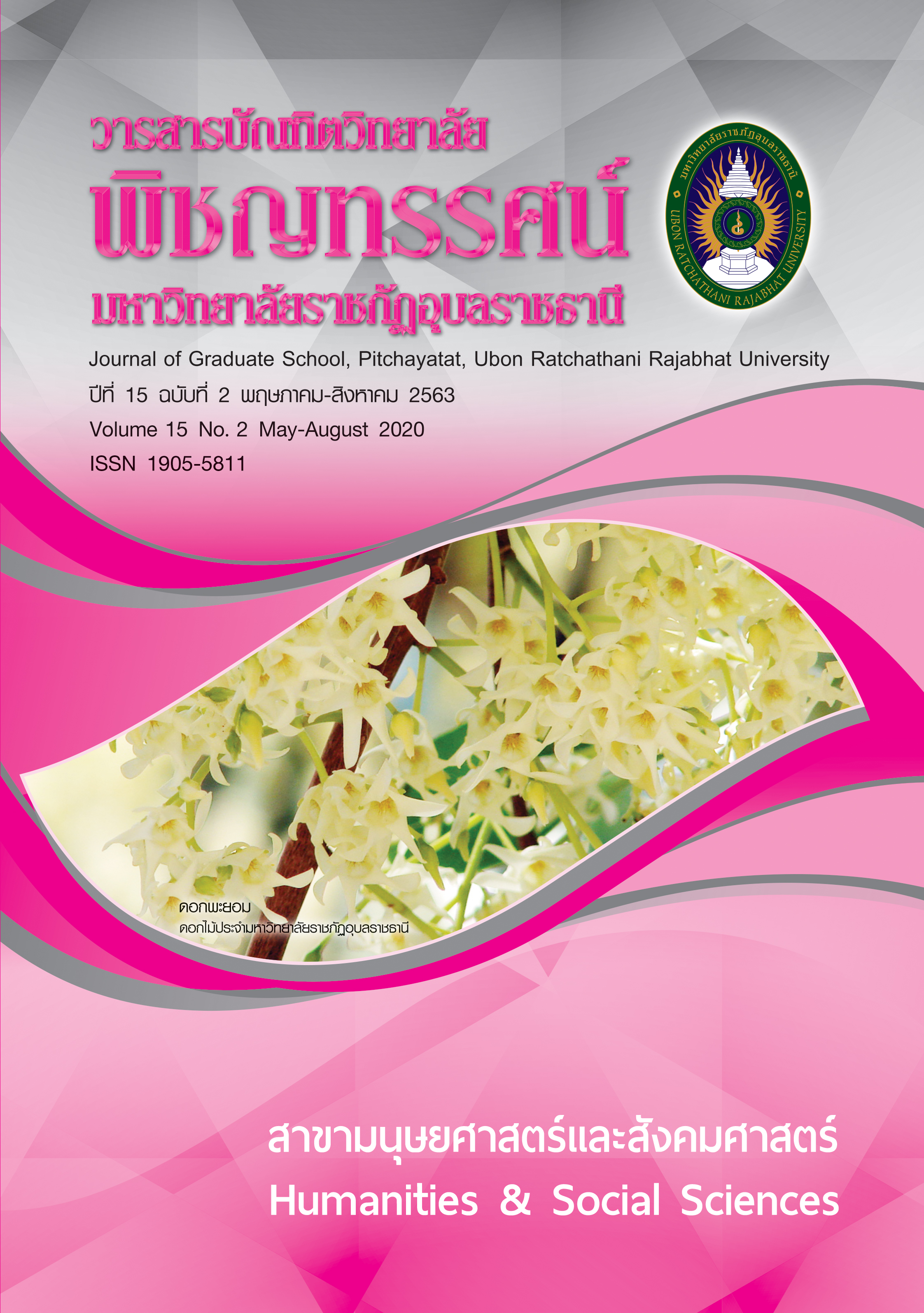การสังเคราะห์กรอบแนวคิดการบริหารงานแบบมุ่งผลสัมฤทธิ์
คำสำคัญ:
การบริหารงาน, ผลสัมฤทธิ์บทคัดย่อ
การวิจัยนี้มีวัตถุประสงค์เพื่อ ค้นหากรอบแนวคิดการบริหารแบบมุ่งผลสัมฤทธิ์ การวิจัยครั้งนี้เป็นการวิจัยเชิงคุณภาพทำการศึกษาและวิเคราะห์เอกสารทางวิชาการที่เกี่ยวข้องกับการบริหารงานแบบมุ่งผลสัมฤทธิ์ ทั้งเอกสารในห้องสมุดทั่วไปและห้องสมุดอิเล็กทรอนิกส์ ผลการสังเคราะห์กรอบแนวคิดการบริหารงานแบบมุ่งผลสัมฤทธิ์พบว่า มีองค์ประกอบคือ
- ความประหยัด ได้แก่ การบริหารที่มุ่งให้ได้มาซึ่งทรัพยากรและการบริการใช้ทรัพยากรนั้นอย่างคุ้มค่า
- ความมีประสิทธิภาพ ได้แก่ หลักการบริหารโดยการเปรียบเทียบระหว่างปัจจัยนำเข้ากับผลผลิต ได้แก่ การสร้างผลผลิตในระดับที่สูงกว่าปัจจัยนำเข้า
- ความมีประสิทธิผล ได้แก่ การได้ผลงานที่บรรลุเป้าหมายขององค์กร มีระบบงานและขั้นตอนการทำงานที่ชัดเจน
- การมีส่วนร่วมระหว่างผู้บริหาร สมาชิกองค์กร ตลอดจนผู้ที่มีส่วนได้ส่วนเสียกลุ่มต่าง ๆ ที่เกี่ยวข้องกับการปฏิบัติงานขององค์กรในทุกระดับปฏิบัติการ
- ความรับผิดชอบ คือการตระหนักถึงสิทธิและหน้าที่ในส่วนที่รับผิดชอบและสามารถตรวจสอบได้
คำสำคัญ: การบริหารงาน ผลสัมฤทธิ์
เอกสารอ้างอิง
คณะกรรมการข้าราชการพลเรือน, สำนักงาน. การบริหารกิจการบ้านเมืองที่ดี. กรุงเทพฯ: ไอเดีย สแควร์, 2548.
จิราพร เรืองจิระชูพร. “วัฒนธรรมองค์การและการอยู่รอด,” วารสารสุทธิปริทัศน์. 19, 58 (พฤษภาคม-สิงหาคม 2549): 28-42.
เฉลิมพงศ์ มีสมนัย. “การบริหารมุ่งผลสัมฤทธิ์,” วารสารการจัดการสมัยใหม่. 2, 2 (กรกฎาคม 2547): 131-139.
ทศพร ศิริสัมพันธ์. การบริหารผลการดำเนินงาน (Performance Management). กรุงเทพฯ: ภาควิชารัฐประศาสนศาสตร์คณะรัฐศาสตร์ จุฬาลงกรณ์มหาวิทยาลัย, 2543.
ทิพาวดี เมฆสวรรค์. การบริหารงานมุ่งผลสัมฤทธิ์. กรุงเทพฯ: คณะกรรมการปฎิรูประบบราชการ สำนักนายกรัฐมนตรี, 2539.
นายกรัฐมนตรี, สำนัก. ระเบียบสำนักนายกรัฐมนตรีว่าด้วยการสร้างระบบบริหารกิจการบ้านเมืองและสังคมที่ดี พ.ศ. 2542. กรุงเทพฯ : สำนักนายกรัฐมนตรี, 2542.
บรรจง อมรชีวิน. การคิดอย่างมีวิจารณญาณ : หลัการพัฒนาการคิดอย่างมีตรรกะ เหตุผลและดุลยพินิจ. กรุงเทพฯ: พิมพ์ลักษณ์, 2556.
ปิยะชัย จันทรวงศ์ไพศาล. การบริหารมุ่งผลสัมฤทธิ์ (RBM) = Results-based Management. กรุงเทพฯ: เอช อาร์เซ็นเตอร์, 2554.
พระปกเกล้า, สถาบัน. ทศธรรม: ตัวชี้วัดการบริหารกิจการบ้านเมืองที่ดี. กรุงเทพฯ: สถาบันพระปกเกล้า, 2549.
พัฒนาครูคณาจารย์และบุคลากรทางการศึกษา, สถาบัน. โครงการพัฒนาสมรรถนะของครูตามระบบการพัฒนาครูและบุคลากรทางการศึกษา. กรุงเทพฯ: กระทรวงศึกษาธิการ, 2551.
ลัดดา ผลวัฒนะ. “ธรรมาภิบาลกับการบริหารมหาวิทยาลัย,” วารสารการบริหารการศึกษา. 8, 2 (เมษายน - กันยายน 2557): 16-27.
วีรยุทธ ชาตะกาญจน์. เทคนิคการบริหารสำหรับนักบริหารการศึกษามืออาชีพ. กรุงเทพฯ: จุฬาลงกรณ์มหาวิทยาลัย, 2551.
ศิริชัย กาญจนวาสี. ทฤษฎีการทดสอบแบบดั้งเดิม. พิมพ์ครั้งที่ 6. กรุงเทพฯ: จุฬาลงกรณ์มหาวิทยาลัย, 2552.
สัญญา เคนาภูมิ. “กระบวนทัศน์ธรรมาภิบาล: กรอบแนวคิดทางการบริหารการปกครอง,” รัฐสภาสาร. 64, 8 (สิงหาคม 2559): 62-92
สุวิทย์ วงศ์รุจิราวาณิชย์. พระราชกฤษฎีกาว่าด้วยหลักเกณฑ์และวิธีการบริหารกิจการบ้านเมืองที่ดี พ.ศ. 2546. กรุงเทพฯ: บาลาลซ์ (ติวเตอร์หมู), 2548.
อรุณ รักธรรม. มนุษยสัมพันธ์กับนักบริหาร. กรุงเทพฯ: สถาบันบัณฑิตพัฒนบริหารศาสตร์, 2532.
Canadian International Development Agency. Results Based Management in CIDA: An Introductory Guide to Concept and Principles. (online) 2000 (Cited 10 April 2012). Available from: http://www.acdi-cida.gc.ca/cida_ind.nsf
Schein, Edgar H. Organizational Psychology. 2nd ed. Englewood Cliffs. NJ: Prentice Hall, 1972.
Marion, I. M. Inclusion and Democracy. New York: Oxford University Press, 2002.
ดาวน์โหลด
เผยแพร่แล้ว
รูปแบบการอ้างอิง
ฉบับ
ประเภทบทความ
สัญญาอนุญาต
บทความทุกเรื่องได้รับการตรวจความถูกต้องทางวิชาการโดยผู้ทรงคุณวุฒิภายนอกอย่างน้อย 3 คน ความคิดเห็นในวารสารพิชญทรรศน์เป็นความคิดเห็นของผู้นิพนธ์มิใช่ความคิดเห็นของผู้จัดทำ จึงมิใช่ความรับผิดชอบของวารสารพิชญทรรศน์ และบทความในวารสารพิชญทรรศน์สงวนสิทธิ์ตามกฎหมายไทย การจะนำไปเผยแพร่ต้องได้รับอนุญาตเป็นลายลักษณ์อักษรจากกองบรรณาธิการ





